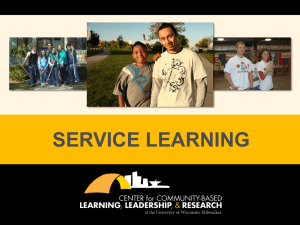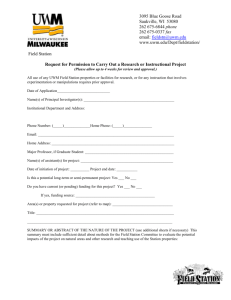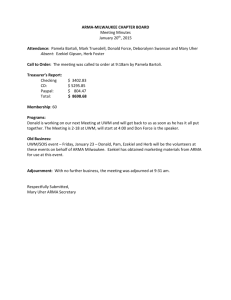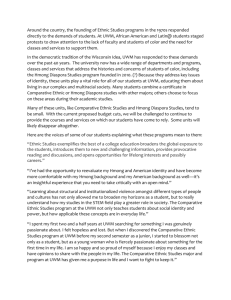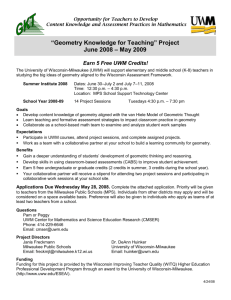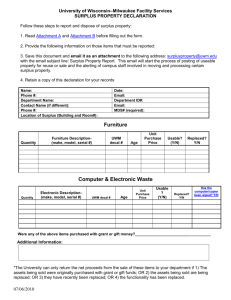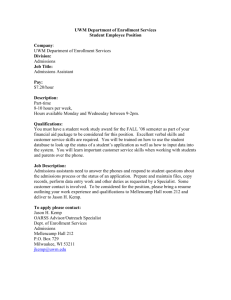BUS ADM 531 002 1036
advertisement
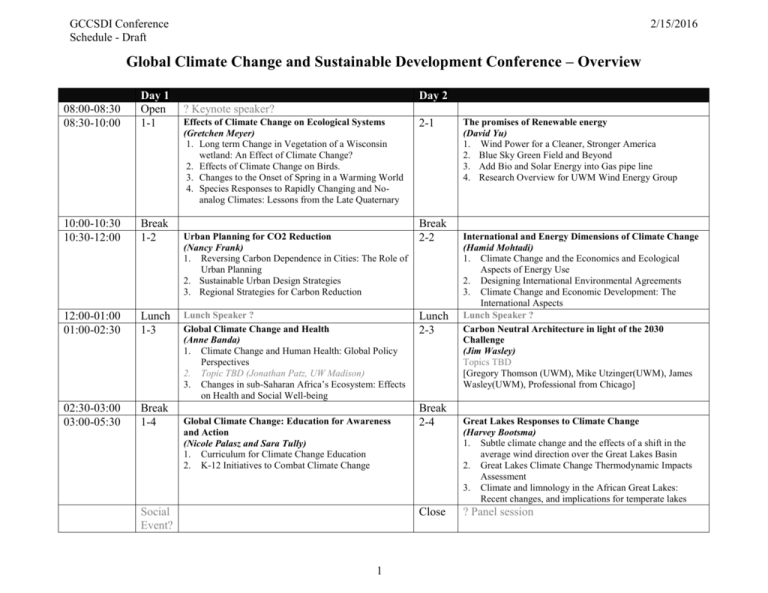
GCCSDI Conference Schedule - Draft 2/15/2016 Global Climate Change and Sustainable Development Conference – Overview 08:00-08:30 08:30-10:00 Day 1 Open 1-1 10:00-10:30 10:30-12:00 Break 1-2 12:00-01:00 01:00-02:30 Lunch 1-3 02:30-03:00 03:00-05:30 Break 1-4 Day 2 ? Keynote speaker? Effects of Climate Change on Ecological Systems (Gretchen Meyer) 1. Long term Change in Vegetation of a Wisconsin wetland: An Effect of Climate Change? 2. Effects of Climate Change on Birds. 3. Changes to the Onset of Spring in a Warming World 4. Species Responses to Rapidly Changing and Noanalog Climates: Lessons from the Late Quaternary Urban Planning for CO2 Reduction (Nancy Frank) 1. Reversing Carbon Dependence in Cities: The Role of Urban Planning 2. Sustainable Urban Design Strategies 3. Regional Strategies for Carbon Reduction Lunch Speaker ? Global Climate Change and Health (Anne Banda) 1. Climate Change and Human Health: Global Policy Perspectives 2. Topic TBD (Jonathan Patz, UW Madison) 3. Changes in sub-Saharan Africa’s Ecosystem: Effects on Health and Social Well-being Global Climate Change: Education for Awareness and Action (Nicole Palasz and Sara Tully) 1. Curriculum for Climate Change Education 2. K-12 Initiatives to Combat Climate Change Social Event? 2-1 Break 2-2 Lunch 2-3 Break 2-4 Close 1 The promises of Renewable energy (David Yu) 1. Wind Power for a Cleaner, Stronger America 2. Blue Sky Green Field and Beyond 3. Add Bio and Solar Energy into Gas pipe line 4. Research Overview for UWM Wind Energy Group International and Energy Dimensions of Climate Change (Hamid Mohtadi) 1. Climate Change and the Economics and Ecological Aspects of Energy Use 2. Designing International Environmental Agreements 3. Climate Change and Economic Development: The International Aspects Lunch Speaker ? Carbon Neutral Architecture in light of the 2030 Challenge (Jim Wasley) Topics TBD [Gregory Thomson (UWM), Mike Utzinger(UWM), James Wasley(UWM), Professional from Chicago] Great Lakes Responses to Climate Change (Harvey Bootsma) 1. Subtle climate change and the effects of a shift in the average wind direction over the Great Lakes Basin 2. Great Lakes Climate Change Thermodynamic Impacts Assessment 3. Climate and limnology in the African Great Lakes: Recent changes, and implications for temperate lakes ? Panel session GCCSDI Conference Schedule - Draft Session Details Session open 1-1 Description ? Effects of Climate Change on Ecological Systems (Gretchen Meyer) This session will consider how climate change is affecting natural areas. Topics will include changes in phenology of plants and animals, and possible effects of climate change on plant communities and birds. 1-2 Presentations Urban Planning for CO2 Reduction (Nancy Frank) 1. Long term Change in Vegetation of a Wisconsin wetland: An Effect of Climate Change? Jason Mills [Biological Sciences, UWM], James Reinartz [Field Station,UWM], Gretchen Meyer [Field Station,UWM], and Erica Young [Biological Sciences, UWM] 2. Effects of Climate Change on Birds Peter Dunn. [Biology, UWM] 3. Changes to the Onset of Spring in a Warming World Mark D. Schwartz [Geography, UWM] 4. Species Responses to Rapidly Changing and No-analog Climates: Lessons from the Late Quaternary John Williams[Geography and Center for Climatic Research, UW-Madison], Steve Jackson [University of Wyoming], and John Kutzbach [University of Wisconsin-Madison] 1. Reversing Carbon Dependence in Cities: The Role of Urban Planning Nancy Frank [Urban Planning, UWM] - no summary provided The presentation will provide an overview of the multiple vectors through which urban planning can address carbon emissions. The principle methods relate to reductions related to materials used in the construction of urban facilities (such as streets) and reductions related to the operation of the city and the behavior of city residents. Overall, however, the field of urban planning needs to produce better information about the relative costs and benefits of different strategies for reducing carbon that considers both the potential and the probably benefits of different strategies. The difference between potential and probably benefits relates to the likelihood of achieving specific changes, e.g., use of mass transit. 2. Sustainable Urban Design Strategies Michael Utzinger [Architecture, UWM] The presentation will review the latest information on urban design strategies that produce significant reductions in carbon emissions. Focus will be on efficiencies from a systems perspective that can be achieved through thoughtful urban design. The efficiencies include reduction in materials use and greater efficiencies in heating and cooling, water use, and lighting, as well as opportunities for shared resource recovery and renewable energy production. 2 GCCSDI Conference Schedule - Draft 3. Regional Strategies for Carbon Reduction Scott Bernstein [Center for Neighborhood Technology, Chicago] This presentation will focus on the regional scale on the land use/transportation connections and strategies that have a reasonable chance of inducing changes in travel behavior. Specifically, Bernstein has written about the "next generation" of transit-oriented development. 1-3 1. 2. 3. Climate Change and Human Health: Global Policy Perspectives Topic TBD (Jonathan Patz, UW Madison) Changes in sub-Saharan Africa’s Ecosystem: Effects on Health and Social Well-being 1. Curriculum for Climate Change Education Janie Besharse [Conservation & Environmental Sciences, UWM] 2. K-12 Initiatives to Combat Climate Change Susan Ermer [Global Environmental Teachings, UW-Stevens Point] 1. Wind Power for a Cleaner, Stronger America Jeff Anthony [Utility Programs and Policy, American Wind Energy Association] 2. Blue Sky Green Field and Beyond Drew Szabo [Renewable Energy Development, We Energies] 3. Add Bio and Solar Energy into Gas pipe line T. C. Jen [Mechanical Engineering Department, UWM] 4. Research Overview for UWM Wind Energy Group David C. Yu [Electrical Engineering and Computer Sciences Department, UWM] International and Energy Dimensions of Climate Change (Hamid Mohtadi) 1. Climate Change and the Economics and Ecological Aspects of Energy Use Stephen Polasky [Applied Economics, University of Minnesota] This session will explore both the international and the energy aspects of climate change as the two are inherently interrelated. The session will consist of a three presentations focusing on (a) the economics and ecology of energy use of 2. Designing International Environmental Agreements Matthew McGinty [Economics, UWM] 3. Climate Change and Economic Development: The International Aspects Hamid Mohtadi [Economics, UWM] Global Climate Change and Health (Anne Banda) - no summary provided - 1-4 Global Climate Change: Education for Awareness and Action – Part II (Nicole Palasz and Sara Tully) - no summary provided - 2-1 The promises of Renewable energy (David Yu) The current state of electricity generation is mostly from limited, non-renewable fossil fuels such as coal, natural gas and oil or environmentally unfriendly sources such as nuclear and hydro. Renewable energy only accounts for 7% of the total fuel source for electric power generation in US. Increasing the renewable energy content in the mix of energy sources will not only benefit the environment, but also reduce the dependency on the traditional fossil fuel. The challenge is how to reliably integrate the renewable energy into the existing energy supply systems. This session highlights some of the activities related to renewable at the national, utility and university levels. 2-2 3 GCCSDI Conference Schedule - Draft climate change (b) the design of global environmental agreements (c) the way in which economics development affects climate change and is affected by it. 2-3 Carbon Neutral Architecture in light of the 2030 Challenge (Jim Wasley) Gregory Thomson [Architecture and Urban Planning, UWM] Mike Utzinger [Architecture, UWM] Buildings account for 36% of energy and 65% of electricity consumption in the United States, contributing significantly to total U.S. greenhouse gas emissions. The 2030 Challenge is a national initiative to reduce the energy consumption of new and renovated buildings towards the goal of carbon neutrality by the year 2030. This session will examine current research by three UWM professors of architecture into achieving this radical energy efficiency goal through better design. 2-4 Close Keelan P. Kaiser [Art, Design and Architecture, Judson College] Great Lakes Responses to Climate Change (Harvey Bootsma) 1. Subtle climate change and the effects of a shift in the average wind direction over the Great Lakes Basin James T. Waples [Great Lakes WATER Institute, UWM] Recent evidence indicates that large lakes in both temperate and tropical regions are responding to climate change, sometimes in unexpected ways. Due to the immense importance of these systems with regard to water supply, food supply, hydroelectric power, transportation, and recreation, it is imperative to understand how they are influenced by climate, and to predict how they may be affected by climate change. This session will focus on recent data documenting climate change impacts that have already occurred on large lakes, as well as predicted future impacts. Data will be presented for both the North American and African Great Lakes. 2. Great Lakes Climate Change Thermodynamic Impacts Assessment Thomas E. Croley II [NOAA Great Lakes Environmental Research Laboratory] 3. Climate and limnology in the African Great Lakes: Recent changes, and implications for temperate lakes Harvey Bootsma [Great Lakes WATER Institute, UWM] ? 4
